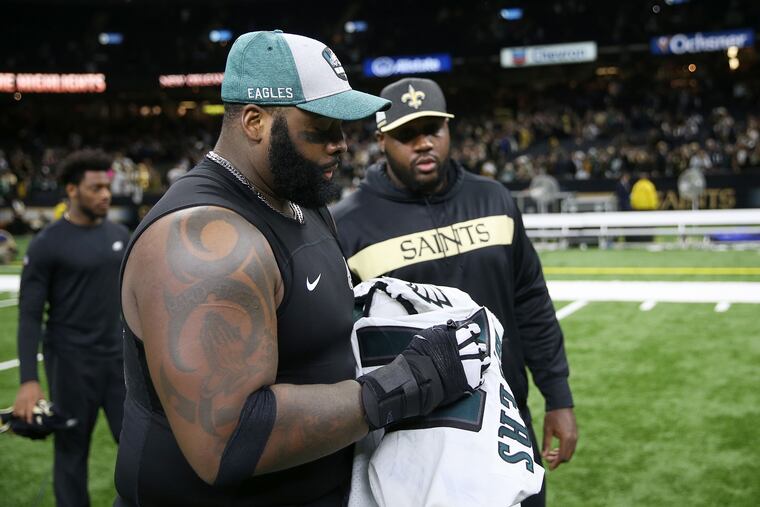The Eagles will give Jason Peters another chance to defy time, and it’s inspiring to see | Mike Sielski
Maybe you have to be at a particular stage of your life or career to appreciate it.

With the NFL’s free-agency period beginning next week, the Eagles have been using these recent days to retain some key players, and in this mission, their offensive line has been one of their primary priorities.
They re-signed Jason Kelce to a one-year contract, making him the highest-paid center in the NFL. They extended the contract of guard Isaac Seumalo for three years, and they’re likely to reach a similar agreement with Halapoulivaati Vaitai.
The thinking behind each of these transactions, whether completed in Kelce and Seumalo’s cases or prospective in Vaitai’s, is pretty clear. Kelce is 31, aging by NFL standards, but the nerve center of the Eagles line. There is no immediate, suitable replacement for him, especially now that Seumalo, 25, who can play and has played center, has improved enough to become a full-time starter at left guard. Vaitai is also 25, and his greatest value is in his versatility. He can play left or right tackle, depending on where he’s needed.
But it’s the depending that matters here, and that gets to what is the most fascinating and, to me, most heartening decision of the Eagles’ offseason so far: their unspoken declaration that Jason Peters, at age 37, will be their starting left tackle again.
If Kelce is aging, Peters is ancient. He missed one season with a torn Achilles tendon. He missed most of another with torn ligaments in his right knee. Yet the Eagles, by all indications, are in no rush to cast him aside. If anything, they are deferential to Peters, his 15 years in the NFL, his nine Pro Bowl and two first-team All-Pro selections, the esteem with which his coaches and teammates still hold him — and, most of all, his status, in the here and now, as their best option at the position.
“He’s not a normal human being,” Howie Roseman, the Eagles’ executive vice president of football operations, told reporters last week at the league’s draft combine. “He’s freaky. He’s a first-ballot Hall of Famer as a player and as a person. So normal rules don’t apply when it comes to Jason.”
Football-wise, assuming that Peters and the Eagles agree to restructure his contract to lower his $13.2 million salary-cap hit, bringing him back in 2019 is a smart and sound strategy. If he can start all 16 regular-season games, as he did last year, then it is all the better for them. If he can’t, they have Vaitai to play in his stead. And either way, they can continue developing Jordan Mailata.
But the compelling part of this strategy isn’t what it says or will say about the Eagles. It’s what it says about Peters.
Peters began his NFL career, with the Buffalo Bills in 2004, not as a left tackle but as a tight end and special-teams player. He covered kickoffs. He made tackles. He blocked a punt and returned it for a touchdown. Only when, on a whim during a practice, the Bills tried him at tackle did they discover Peters’ true calling.
“Our best pass rusher was Aaron Schobel, and he was a double-digit sack guy, and he could not beat him,” former Bills lineman Ross Tucker, who analyzes the NFL for Sirius XM and Westwood One radio, said in an October 2016 interview. “It was remarkable. Jason had no idea what he was doing, but he was just that gifted.”
Over the decade and a half since, Peters has traveled to the other pole of that continuum. Consider how rare it is to have the physical traits — the strength, the understanding of leverage, the nimble footwork — to excel as a left tackle in the NFL. Then consider how rare it is to combine those traits with the desire and work ethic to master your craft and maintain that level of excellence for so long.
Possess the former and not the latter, and you’re Danny Watkins. Possess the latter and not the former, and you could be anybody who isn’t 6-foot-4 and 330 pounds and can’t move like a Humvee rumbling downhill.
“So much of that position is football intelligence and technique,” Tucker said. “Those things, you just grow with and get better with every year, not worse. It becomes, how long can you hold off Father Time from an athletic standpoint? And the thing about that is, you can get away with losing a little bit more at that position because it’s more about technique.”
That’s the heartening part, the inspirational part, of Peters’ refusal to go gently into retirement. He has found the job he was meant to do, and he has found ways to keep doing it — to cast aside what no longer works, to overcome some substantial obstacles, to pick up new skills and subtleties, to use his accumulated experiences and wisdom.
Perhaps one has to be at a similar stage of life or career to appreciate that journey, or perhaps one simply has to have been around Jason Peters enough, or someone like him, to recognize it when they see it. I will be hoping that he returns to the Eagles, and that he plays a full season and more and plays well, not because of what it would mean to his football team, but because of what it would signify to him, and to the rest of us.